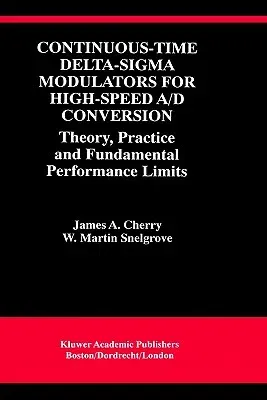James A Cherry
(Author)Continuous-Time Delta-SIGMA Modulators for High-Speed A/D Conversion: Theory, Practice and Fundamental Performance Limits (2000)Hardcover - 2000, 30 September 1999

Qty
1
Turbo
Ships in 2 - 3 days
In Stock
Free Delivery
Cash on Delivery
15 Days
Free Returns
Secure Checkout

Part of Series
The Springer International Engineering and Computer Science
Part of Series
Kluwer International Series in Engineering & Computer Science
Part of Series
International Series in Engineering and Computer Science
Part of Series
Analog Circuits and Signal Processing
Part of Series
Kluwer International Series in Engineering and Computer Scie
Part of Series
International Series in Engineering & Computer Sci
Part of Series
Springer International Series in Engineering and Computer Sc
Part of Series
Springer International Series in Engineering and Computethe
Print Length
250 pages
Language
English
Publisher
Springer
Date Published
30 Sep 1999
ISBN-10
0792386256
ISBN-13
9780792386254
Description
Product Details
Authors:
Book Edition:
2000
Book Format:
Hardcover
Country of Origin:
US
Date Published:
30 September 1999
Dimensions:
24.28 x
15.85 x
2.03 cm
ISBN-10:
0792386256
ISBN-13:
9780792386254
Language:
English
Location:
New York, NY
Pages:
250
Publisher:
Series:
The Springer International Engineering and Computer ScienceKluwer International Series in Engineering & Computer ScienceInternational Series in Engineering and Computer ScienceAnalog Circuits and Signal ProcessingKluwer International Series in Engineering and Computer ScieInternational Series in Engineering & Computer SciSpringer International Series in Engineering and Computer ScSpringer International Series in Engineering and Computethe
Weight:
576.06 gm